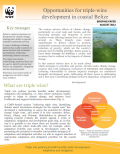This is the first edition of the India Energy Subsidy Review, a biannual publication of the International Institute for Sustainable Development’s (IISD) Global Subsidies Initiative (GSI). Part One of each edition outlines economic and policy developments affecting India’s subsidized key fuel markets (diesel, liquefied petroleum gas, kerosene and natural gas), and analyses the dynamics of each market. Part Two features analysis by guest authors on issues related to energy pricing policy. In this edition, two articles examine the impact of energy subsidy reforms on India’s transport and agriculture sectors respectively. This edition of the review then concludes with a commentary by Dr Kirit Parikh and Jyoti Parikh, distinguished practitioners in the field.
This report provides recommendations to develop and implement policy reforms supporting market formation and fostering a favorable climate for investments in the sectors of energy efficiency and renewable energy sources. This wide-ranging regional assessment is based on case studies, expert workshops and senior policy maker seminars. It encourages policy makers to focus on: “quick wins” to demonstrate rapid results and increase political support through those measures that can be introduced in less than a year and are likely to produce significant impact at moderate costs; “essentials” as the backbone of a comprehensive energy efficiency and renewable energy policy, affecting the areas of great

The serious adverse effects of climate change, particularly on coral reefs and forests, and the increasing intensity and frequency of severe weather events affecting human lives, are obvious around us. These impacts pose major impediments to Belize’s efforts to promote sustainable economic and social development and reduction of poverty, which are the country’s primary and overriding priorities. This briefing paper, Opportunities for triple-wins development in coastal Belize, examines key actions underway to promote at Mangrove conservation and restoration along the Placencia Lagoon, Belize.
The purpose of this paper is to assess evidence of ‘triple wins’ on the ground, and the feasibility of triple wins that do not generate negative impacts. It describes the theoretical linkages that exist between adaptation, mitigation and development, as well as the trade-offs and synergies that might exist between them. Using four developing country studies, this working paper makes a simple assessment of the extent of climate compatible development policy in practice through the lens of ‘no-regrets’, ‘low regrets’ and ‘with regrets’ decision making. The lack of evidence of either policy or practice of triple wins significantly limits the capacity of donors to identify, monitor or evaluate ‘triple wins at this point in time. It is recommended that a more strategic assessment of the distributional and financial implications of 'triple wins' policies.
Energy taxes can produce substantial environmental and revenue benefits and are an important component of countries’ fiscal systems. Although the principle that these taxes should reflect global warming, air pollution, road congestion, and other adverse environmental impacts of energy use is well established, there has been little previous work providing guidance on how countries can put this principle into practice. This book develops a practical methodology, and associated tools, to show how the major environmental damages from energy can be quantified for different countries and used to design the efficient set of energy taxes. The results, which are illustrated for more than 150 countries, suggest there is pervasive mispricing of energy across developed and developing countries alike with much at stake in policy reform. At a global level, implementing efficient energy prices would reduce carbon emissions by an estimated 23 percent and fossil-fuel air pollution deaths by 63 percent, while raising revenues (badly needed for fiscal consolidation and reducing other burdensome taxes) averaging 2.6 percent of GDP.
